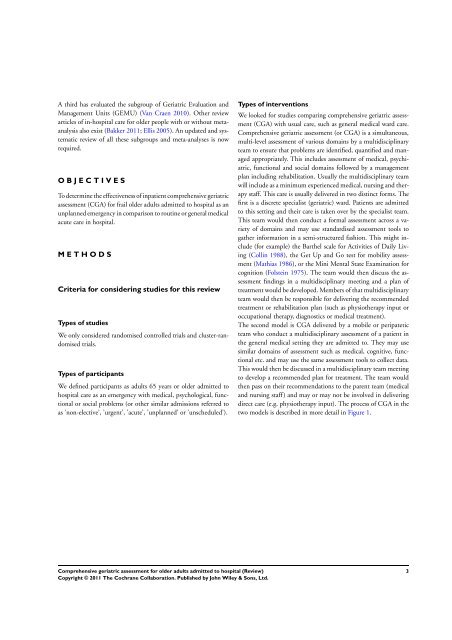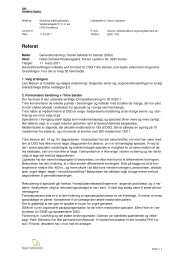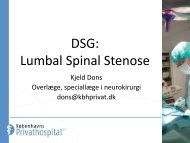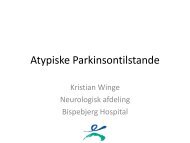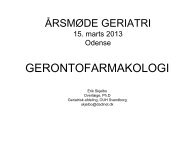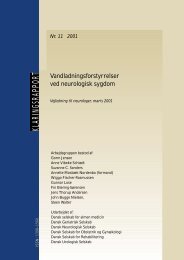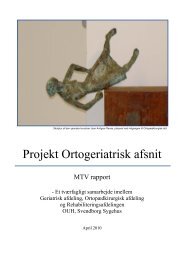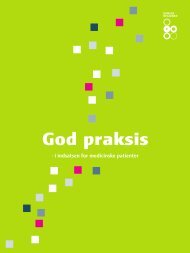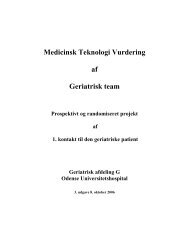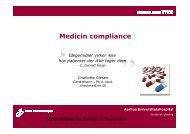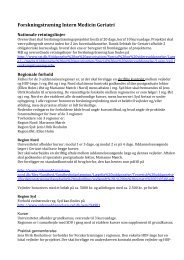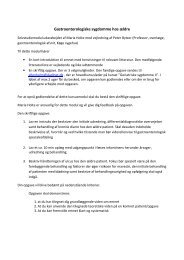Comprehensive geriatric assessment for older adults admitted to ...
Comprehensive geriatric assessment for older adults admitted to ...
Comprehensive geriatric assessment for older adults admitted to ...
You also want an ePaper? Increase the reach of your titles
YUMPU automatically turns print PDFs into web optimized ePapers that Google loves.
A third has evaluated the subgroup of Geriatric Evaluation and<br />
Management Units (GEMU) (Van Craen 2010). Other review<br />
articles of in-hospital care <strong>for</strong> <strong>older</strong> people with or without metaanalysis<br />
also exist (Bakker 2011; Ellis 2005). An updated and systematic<br />
review of all these subgroups and meta-analyses is now<br />
required.<br />
O B J E C T I V E S<br />
To determine the effectiveness of inpatient comprehensive <strong>geriatric</strong><br />
<strong>assessment</strong> (CGA) <strong>for</strong> frail <strong>older</strong> <strong>adults</strong> <strong>admitted</strong> <strong>to</strong> hospital as an<br />
unplanned emergency in comparison <strong>to</strong> routine or general medical<br />
acute care in hospital.<br />
M E T H O D S<br />
Criteria <strong>for</strong> considering studies <strong>for</strong> this review<br />
Types of studies<br />
We only considered randomised controlled trials and cluster-randomised<br />
trials.<br />
Types of participants<br />
We defined participants as <strong>adults</strong> 65 years or <strong>older</strong> <strong>admitted</strong> <strong>to</strong><br />
hospital care as an emergency with medical, psychological, functional<br />
or social problems (or other similar admissions referred <strong>to</strong><br />
as ’non-elective’, ’urgent’, ’acute’, ’unplanned’ or ’unscheduled’).<br />
<strong>Comprehensive</strong> <strong>geriatric</strong> <strong>assessment</strong> <strong>for</strong> <strong>older</strong> <strong>adults</strong> <strong>admitted</strong> <strong>to</strong> hospital (Review)<br />
Copyright © 2011 The Cochrane Collaboration. Published by John Wiley & Sons, Ltd.<br />
Types of interventions<br />
We looked <strong>for</strong> studies comparing comprehensive <strong>geriatric</strong> <strong>assessment</strong><br />
(CGA) with usual care, such as general medical ward care.<br />
<strong>Comprehensive</strong> <strong>geriatric</strong> <strong>assessment</strong> (or CGA) is a simultaneous,<br />
multi-level <strong>assessment</strong> of various domains by a multidisciplinary<br />
team <strong>to</strong> ensure that problems are identified, quantified and managed<br />
appropriately. This includes <strong>assessment</strong> of medical, psychiatric,<br />
functional and social domains followed by a management<br />
plan including rehabilitation. Usually the multidisciplinary team<br />
will include as a minimum experienced medical, nursing and therapy<br />
staff. This care is usually delivered in two distinct <strong>for</strong>ms. The<br />
first is a discrete specialist (<strong>geriatric</strong>) ward. Patients are <strong>admitted</strong><br />
<strong>to</strong> this setting and their care is taken over by the specialist team.<br />
This team would then conduct a <strong>for</strong>mal <strong>assessment</strong> across a variety<br />
of domains and may use standardised <strong>assessment</strong> <strong>to</strong>ols <strong>to</strong><br />
gather in<strong>for</strong>mation in a semi-structured fashion. This might include<br />
(<strong>for</strong> example) the Barthel scale <strong>for</strong> Activities of Daily Living<br />
(Collin 1988), the Get Up and Go test <strong>for</strong> mobility <strong>assessment</strong><br />
(Mathias 1986), or the Mini Mental State Examination <strong>for</strong><br />
cognition (Folstein 1975). The team would then discuss the <strong>assessment</strong><br />
findings in a multidisciplinary meeting and a plan of<br />
treatment would be developed. Members of that multidisciplinary<br />
team would then be responsible <strong>for</strong> delivering the recommended<br />
treatment or rehabilitation plan (such as physiotherapy input or<br />
occupational therapy, diagnostics or medical treatment).<br />
The second model is CGA delivered by a mobile or peripatetic<br />
team who conduct a multidisciplinary <strong>assessment</strong> of a patient in<br />
the general medical setting they are <strong>admitted</strong> <strong>to</strong>. They may use<br />
similar domains of <strong>assessment</strong> such as medical, cognitive, functional<br />
etc. and may use the same <strong>assessment</strong> <strong>to</strong>ols <strong>to</strong> collect data.<br />
This would then be discussed in a multidisciplinary team meeting<br />
<strong>to</strong> develop a recommended plan <strong>for</strong> treatment. The team would<br />
then pass on their recommendations <strong>to</strong> the parent team (medical<br />
and nursing staff) and may or may not be involved in delivering<br />
direct care (e.g. physiotherapy input). The process of CGA in the<br />
two models is described in more detail in Figure 1.<br />
3


